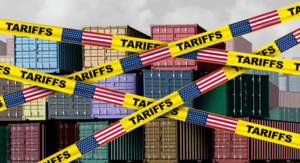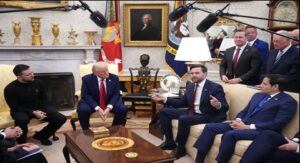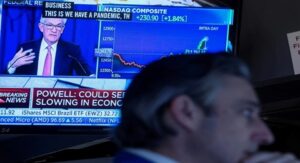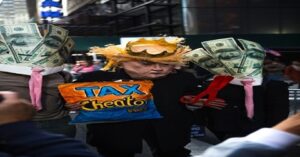
Will France’s Political Shake-Up Disrupt Its Financial Stability?
France’s political shake-up has sparked concerns over its potential impact on the country’s financial stability. Historically, France has benefited from what former President Valéry Giscard d’Estaing called an “exorbitant privilege,” allowing it to borrow at low rates despite fiscal deficits.
However, President Emmanuel Macron’s decision to dissolve the National Assembly and call a snap election, following a rise in support for the far-right, has led to market unease. Investors are wary of the political turmoil and the possibility of a government less committed to fiscal discipline, raising questions about the resilience of France’s economic standing within the European monetary union.
France’s Political Shake-Up
The political landscape in France is on the cusp of a significant shift, stirring concerns about potential impacts on the nation’s financial stability. With President Emmanuel Macron’s decision to dissolve the National Assembly and call for a snap election following a surge in support for the far-right, markets are reacting with apprehension.
This article examines six key points to understand whether France’s political shake-up will indeed disrupt its financial stability.
Read More: Europe’s Geoeconomic Challenges
Table of Contents
1. The Historical Context of France’s Fiscal Privilege
France has enjoyed what former finance minister Valéry Giscard d’Estaing termed an “exorbitant privilege” similar to that of the United States with the world’s reserve currency. Despite persistently high budget deficits, France has been able to borrow money at rates comparable to fiscally conservative Germany.
This unusual financial stability, despite credit downgrades, can be traced back to the European monetary union’s creation. France’s political shake-up, including shifts in government policies and economic strategies, has also influenced its financial landscape.
The Maastricht Treaty of 1992 established a monetary union without a fiscal union, creating a framework where the European Central Bank (ECB) could act as a lender of last resort under specific fiscal rules enforced by the European Commission.
Read More: Crucial Role of European People’s Party
2. The Political Catalyst and Market Reactions
The current political upheaval began with the European Parliament election, where far-right parties gained significant traction. France’s political shake-up was further intensified by President Macron’s subsequent dissolution of the National Assembly and the call for a snap election, which have been met with negative market reactions.
Investors are cautious, yet they might be underestimating France’s inherent financial resilience, a resilience built on decades of maneuvering within the European Union’s fiscal framework. Historically, France’s governments have navigated fiscal leniency from Brussels, maintaining market confidence despite fiscal non-compliance.
Read More: Geopolitics of Economic Development in the Middle East
3. The Role of the European Central Bank and Fiscal Rules
The ECB’s role has been crucial in maintaining France’s fiscal stability. The ECB’s willingness to buy unlimited quantities of eurozone member-state bonds, provided that fiscal rules are adhered to, has underpinned market confidence.
France has often skirted these rules but remained on a ‘naughty list’ rather than facing severe penalties. This leniency was born out of a pragmatic desire to avoid destabilizing one of the EU’s core economies. However, with the fiscal rules reinstated post-COVID and France’s political shake-up, France’s current budget deficit of 5.1% far exceeds the 3% threshold, increasing the sensitivity of its fiscal relationship with Brussels.
Read More: The Cost of De-Dollarization
4. Potential Outcomes of the Snap Election
The snap election could potentially lead to a government less inclined towards fiscal discipline. France’s political shake-up could have significant implications for fiscal policy. If far-right parties, led by Marine Le Pen’s National Rally and allies, secure significant power, markets fear a deviation from fiscal prudence.
In 2017, Le Pen’s proposal to abandon the euro caused significant market turmoil. Although she has since moderated her stance on the euro, her economic policies continue to provoke market anxiety. The specter of a right-wing government could lead to more rhetorical brinkmanship, unsettling markets further, although practical policy shifts may be less drastic than feared.
Read More: Global Political Instability Signals for Rethinking Political Economics
5. The Fiscal Dance with Brussels
Regardless of the election outcome, the “fiscal dance” between Paris and Brussels is expected to continue. France’s political shake-up, whether under a right-wing government under Le Pen maintaining the existing charade with more aggressive rhetoric but similar fiscal policies or a left-wing government pursuing a tax-and-spend approach, could significantly influence the fiscal landscape.
Higher revenues from increased taxes might placate the European fiscal authorities. Thus, while markets might react to the political rhetoric, the actual fiscal policy may not diverge dramatically from the status quo.
6. The Risk of Political Stalemate
The most destabilizing outcome would be a political stalemate. If no party secures a clear majority, resulting in a fragmented parliament, forming a stable government could become nearly impossible. Such a scenario would paralyze France’s ability to engage with Brussels on fiscal matters, potentially leading to prolonged political limbo, including France’s political shake-up.
This uncertainty could severely impact financial markets and economic stability, not only in France but across the European Union.
Read More: US-China Trade War Threatens Global Economic Stability
Bottom Line
France’s political shake-up certainly poses risks to its financial stability, but the extent of disruption will depend on the election outcome and subsequent government policies. The country’s historical fiscal privilege within the EU provides a buffer, but this privilege is not invincible. Market reactions are already showing signs of concern, reflecting uncertainties about future fiscal discipline.
However, France’s entrenched position within the European monetary framework and the ECB’s supportive role provide significant resilience. The real test will be whether the new government, whatever its composition, can navigate the delicate balance between domestic political pressures and adherence to European fiscal rules without triggering a financial crisis.





